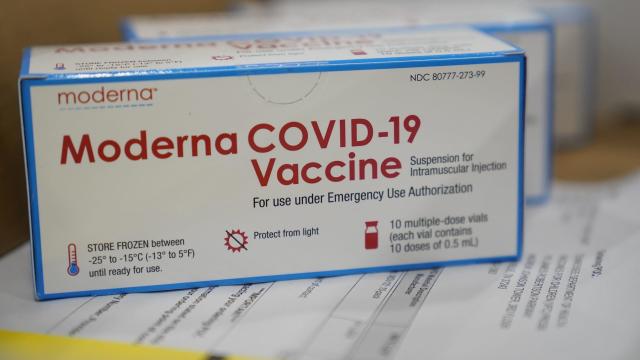The covid-19 vaccine developed by Moderna can likely fend off worrying variants of the coronavirus first found in the UK and South Africa, the company announced Monday. Moderna’s preliminary data appears to show that its covid-19 vaccine produces a strong immune response to these variants. However, the company still intends to work on developing a booster shot for the variant found in South Africa and others if needed.
Concern grew over these genetic variants last December, after it became clear that they were spreading widely in their respective countries. Scientists now believe that B 1.1.7, the variant in the UK, and B.1.351, the variant in South Africa, are more transmissible than previously circulating strains of the coronavirus. Since then, several countries including the U.S. have reported spotting these or similar variants spreading locally.
Because these variants contain multiple important mutations that change the virus, some scientists have worried these variants could evade the immune response of people previously infected or vaccinated. Some early data suggests that could be the case: Last week, for instance, the South African government announced finding evidence that B.1.351 could dodge existing immunity in some residents infected during the country’s first wave of the pandemic.
[referenced id=”1665691″ url=”https://gizmodo.com.au/2021/01/south-african-coronavirus-variant-may-dodge-existing-immunity-in-some-people/” thumb=”https://gizmodo.com.au/wp-content/uploads/2021/01/20/ncj45jlrru3h8ihlctpv-300×169.jpg” title=”South African Coronavirus Variant May Dodge Existing Immunity in Some People” excerpt=”Experts are becoming increasingly worried that at least some variants of the coronavirus will pose an added challenge to limiting the spread of covid-19 through vaccination. Recent data announced over the weekend suggests a variant first found in South Africa can escape detection from antibodies in some people who had…”]
Vaccine-provided immunity isn’t necessarily the same as natural immunity, though. And there’s been some early evidence showing that vaccines may still work as intended against these variants. A study in early January found that the Pfizer vaccine worked effectively against virus strains made to carry a key mutation found in B.1.351 and B 1.1.7. However, Moderna’s data seems to be the first looking directly at whether the antibodies from vaccinated people (taken from blood samples) can neutralise these variants, as opposed to select mutations.
The results look mostly encouraging. According to Moderna, vaccinated people produced a similar level of neutralising antibodies to B 1.1.7 as they did to earlier strains. With B.1.351, levels of neutralising antibodies dropped sixfold, but the amount of neutralising activity left was still deemed enough to ensure protection against illness.
“We are encouraged by these new data, which reinforce our confidence that the Moderna covid-19 vaccine should be protective against these newly detected variants,” said Moderna CEO Stéphane Bancel in a statement released by the company.
The findings have yet to be released to the public, though they’re expected to be posted on the preprint website bioRXiv soon. The study was carried out with the help of the U.S. federal government through the National Institutes of Health.
[referenced id=”1662944″ url=”https://gizmodo.com.au/2021/01/early-evidence-suggests-pfizer-vaccine-works-against-new-coronavirus-variant/” thumb=”https://gizmodo.com.au/wp-content/uploads/2021/01/09/ke0eidghcgxpd7x1rzxm-300×169.jpg” title=”Early Evidence Suggests Pfizer Vaccine Works Against New Coronavirus Variant” excerpt=”Scientists are hard at work testing out whether mutations found in new variants of the coronavirus could bypass the immunity offered by currently developed vaccines. The first results from this work are encouraging: They suggest that the Pfizer vaccine is still effective against one important mutation found in these variants….”]
One important caveat to all this is that we don’t have a clear marker of immunity to the coronavirus in humans — what scientists call “correlates of protection.” Some mix of antibodies, T cells, and B cells specific to the virus will protect people from illness, but we don’t know the exact amounts of each needed (or if these amounts differ between different groups of people). So right now, scientists are making educated guesses about what these lab results should mean for immunity, both over the short and long-term.
Though the results could signal that neither variant will greatly threaten the effectiveness of Moderna’s vaccine (or Pfizer/BioNTech’s similar mRNA vaccine), there’s still no guarantee. And the results for B.1.351 aren’t completely reassuring. That’s likely why Moderna is moving ahead with efforts to develop a vaccine adjusted to match B.1.351 specifically; it also plans to test out whether an additional booster shot of the regular vaccine will provide further protection against these and any future variants (Two doses, taken a month apart, are the standard course). Ideally, these measures won’t be needed, but the time to work on them should be now.
